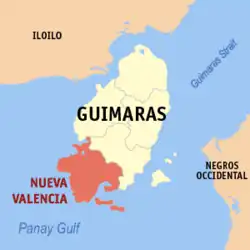Nueva Valencia | |
|---|---|
| Municipality of Nueva Valencia | |
 Taklong Island | |
 Flag | |
 Map of Guimaras with Nueva Valencia highlighted | |
OpenStreetMap | |
.svg.png.webp) Nueva Valencia Location within the Philippines | |
| Coordinates: 10°31′33″N 122°32′23″E / 10.525919°N 122.539783°E | |
| Country | Philippines |
| Region | Western Visayas |
| Province | Guimaras |
| District | Lone district |
| Founded | January 1, 1941 |
| Barangays | 22 (see Barangays) |
| Government | |
| • Type | Sangguniang Bayan |
| • Mayor | Emmanuel D. Galila |
| • Vice Mayor | Paul Vincent G. de la Cruz |
| • Representative | Ma. Lucille L. Nava |
| • Municipal Council | Members |
| • Electorate | 27,338 voters (2022) |
| Area | |
| • Total | 137.12 km2 (52.94 sq mi) |
| Elevation | 13 m (43 ft) |
| Highest elevation | 1,064 m (3,491 ft) |
| Lowest elevation | 0 m (0 ft) |
| Population (2020 census)[3] | |
| • Total | 42,771 |
| • Density | 310/km2 (810/sq mi) |
| • Households | 10,903 |
| Economy | |
| • Income class | 3rd municipal income class |
| • Poverty incidence | 15.22 |
| • Revenue | ₱ 147.3 million (2020) |
| • Assets | ₱ 311.3 million (2020) |
| • Expenditure | ₱ 124.5 million (2020) |
| • Liabilities | ₱ 61.35 million (2020) |
| Service provider | |
| • Electricity | Guimaras Electric Cooperative (GUIMELCO) |
| Time zone | UTC+8 (PST) |
| ZIP code | 5046 |
| PSGC | |
| IDD : area code | +63 (0)33 |
| Native languages | Hiligaynon Ati Tagalog |
| Website | nuevavalencia |
Nueva Valencia, officially the Municipality of Nueva Valencia (Hiligaynon: Banwa sang Nueva Valencia; Tagalog: Bayan ng Nueva Valencia), is a 3rd class municipality in the province of Guimaras, Philippines. According to the 2020 census, it has a population of 42,771 people.[3]
Nueva Valencia is known for its numerous white sand beaches, including the popular Alubihod Beach and Taklong Island Beach, as well as islets such as the islands of Guiwanon (or Guiuanon), Panobolon, etc. Guisi Lighthouse, considered the second oldest lighthouse in the Philippines, is also one of the attractions in the municipality.[5][6]
This is the site of the Guimaras oil spill in August 2006, when the oil tanker MT Solar 1 sank a few kilometers from Nueva Valencia.
Nueva Valencia is a part of the Metro Iloilo–Guimaras area, centered on Iloilo City. It is 13 kilometres (8.1 mi) from Jordan.
Geography
Barangays
Nueva Valencia is politically subdivided into 22 barangays. [7] Each barangay consists of puroks and some have sitios.
- Cabalagnan
- Calaya
- Canhawan
- Concordia Sur
- Dolores
- Guiwanon
- Igang
- Igdarapdap
- La Paz
- Lanipe
- Lucmayan
- Magamay
- Napandong
- Oracon Sur
- Pandaraonan
- Panobolon
- Poblacion
- Salvacion
- San Antonio
- San Roque
- Santo Domingo
- Tando
Climate
| Climate data for Nueva Valencia, Guimaras | |||||||||||||
|---|---|---|---|---|---|---|---|---|---|---|---|---|---|
| Month | Jan | Feb | Mar | Apr | May | Jun | Jul | Aug | Sep | Oct | Nov | Dec | Year |
| Mean daily maximum °C (°F) | 30 (86) |
31 (88) |
32 (90) |
33 (91) |
32 (90) |
30 (86) |
29 (84) |
29 (84) |
28 (82) |
29 (84) |
30 (86) |
30 (86) |
30 (86) |
| Mean daily minimum °C (°F) | 21 (70) |
21 (70) |
22 (72) |
23 (73) |
24 (75) |
24 (75) |
24 (75) |
24 (75) |
24 (75) |
24 (75) |
23 (73) |
22 (72) |
23 (73) |
| Average precipitation mm (inches) | 19 (0.7) |
17 (0.7) |
26 (1.0) |
37 (1.5) |
119 (4.7) |
191 (7.5) |
258 (10.2) |
260 (10.2) |
248 (9.8) |
196 (7.7) |
97 (3.8) |
39 (1.5) |
1,507 (59.3) |
| Average rainy days | 7.2 | 5.2 | 8.3 | 11.9 | 22.3 | 26.5 | 28.3 | 28.2 | 27.3 | 26.4 | 18.7 | 11.8 | 222.1 |
| Source: Meteoblue[8] | |||||||||||||
Demographics
.jpg.webp)
| Year | Pop. | ±% p.a. |
|---|---|---|
| 1903 | 3,459 | — |
| 1948 | 9,472 | +2.26% |
| 1960 | 14,398 | +3.55% |
| 1970 | 19,306 | +2.97% |
| 1975 | 21,887 | +2.55% |
| 1980 | 24,447 | +2.24% |
| 1990 | 30,703 | +2.31% |
| 1995 | 27,158 | −2.27% |
| 2000 | 30,716 | +2.67% |
| 2007 | 35,026 | +1.83% |
| 2010 | 37,852 | +2.86% |
| 2015 | 39,810 | +0.97% |
| 2020 | 42,771 | +1.42% |
| Source: Philippine Statistics Authority[9][10][11][12] | ||
In the 2020 census, the population of Nueva Valencia was 42,771 people,[3] with a density of 310 inhabitants per square kilometre or 800 inhabitants per square mile.
Economy
References
- ↑ Municipality of Nueva Valencia | (DILG)
- ↑ "2015 Census of Population, Report No. 3 – Population, Land Area, and Population Density" (PDF). Philippine Statistics Authority. Quezon City, Philippines. August 2016. ISSN 0117-1453. Archived (PDF) from the original on May 25, 2021. Retrieved July 16, 2021.
- 1 2 3 Census of Population (2020). "Region VI (Western Visayas)". Total Population by Province, City, Municipality and Barangay. Philippine Statistics Authority. Retrieved 8 July 2021.
- ↑ "PSA Releases the 2018 Municipal and City Level Poverty Estimates". Philippine Statistics Authority. 15 December 2021. Retrieved 22 January 2022.
- ↑ "Guisi Lighthouse : The Amazing Ruins in Guimaras". The Pinoy Traveler. Retrieved 2023-07-08.
- ↑ Gabiana, Pryscilla (2020-08-07). "Guisi Lighthouse Guimaras: Second Oldest Lighthouse in the Philippines". vismin.ph. Retrieved 2023-07-08.
- ↑ "Province: Guimaras". PSGC Interactive. Quezon City, Philippines: Philippine Statistics Authority. Retrieved 12 November 2016.
- ↑ "Nueva Valencia: Average Temperatures and Rainfall". Meteoblue. Retrieved 28 April 2020.
- ↑ Census of Population (2015). "Region VI (Western Visayas)". Total Population by Province, City, Municipality and Barangay. Philippine Statistics Authority. Retrieved 20 June 2016.
- ↑ Census of Population and Housing (2010). "Region VI (Western Visayas)" (PDF). Total Population by Province, City, Municipality and Barangay. National Statistics Office. Retrieved 29 June 2016.
- ↑ Censuses of Population (1903–2007). "Region VI (Western Visayas)". Table 1. Population Enumerated in Various Censuses by Province/Highly Urbanized City: 1903 to 2007. National Statistics Office.
{{cite encyclopedia}}: CS1 maint: numeric names: authors list (link) - ↑ "Province of Guimaras". Municipality Population Data. Local Water Utilities Administration Research Division. Retrieved 17 December 2016.
- ↑ "Poverty incidence (PI):". Philippine Statistics Authority. Retrieved December 28, 2020.
- ↑ "Estimation of Local Poverty in the Philippines" (PDF). Philippine Statistics Authority. 29 November 2005.
- ↑ "2003 City and Municipal Level Poverty Estimates" (PDF). Philippine Statistics Authority. 23 March 2009.
- ↑ "City and Municipal Level Poverty Estimates; 2006 and 2009" (PDF). Philippine Statistics Authority. 3 August 2012.
- ↑ "2012 Municipal and City Level Poverty Estimates" (PDF). Philippine Statistics Authority. 31 May 2016.
- ↑ "Municipal and City Level Small Area Poverty Estimates; 2009, 2012 and 2015". Philippine Statistics Authority. 10 July 2019.
- ↑ "PSA Releases the 2018 Municipal and City Level Poverty Estimates". Philippine Statistics Authority. 15 December 2021. Retrieved 22 January 2022.
External links
- Official webpage of the Province of Guimaras: Nueva Valencia
- Philippine Standard Geographic Code
- Philippine Census Information